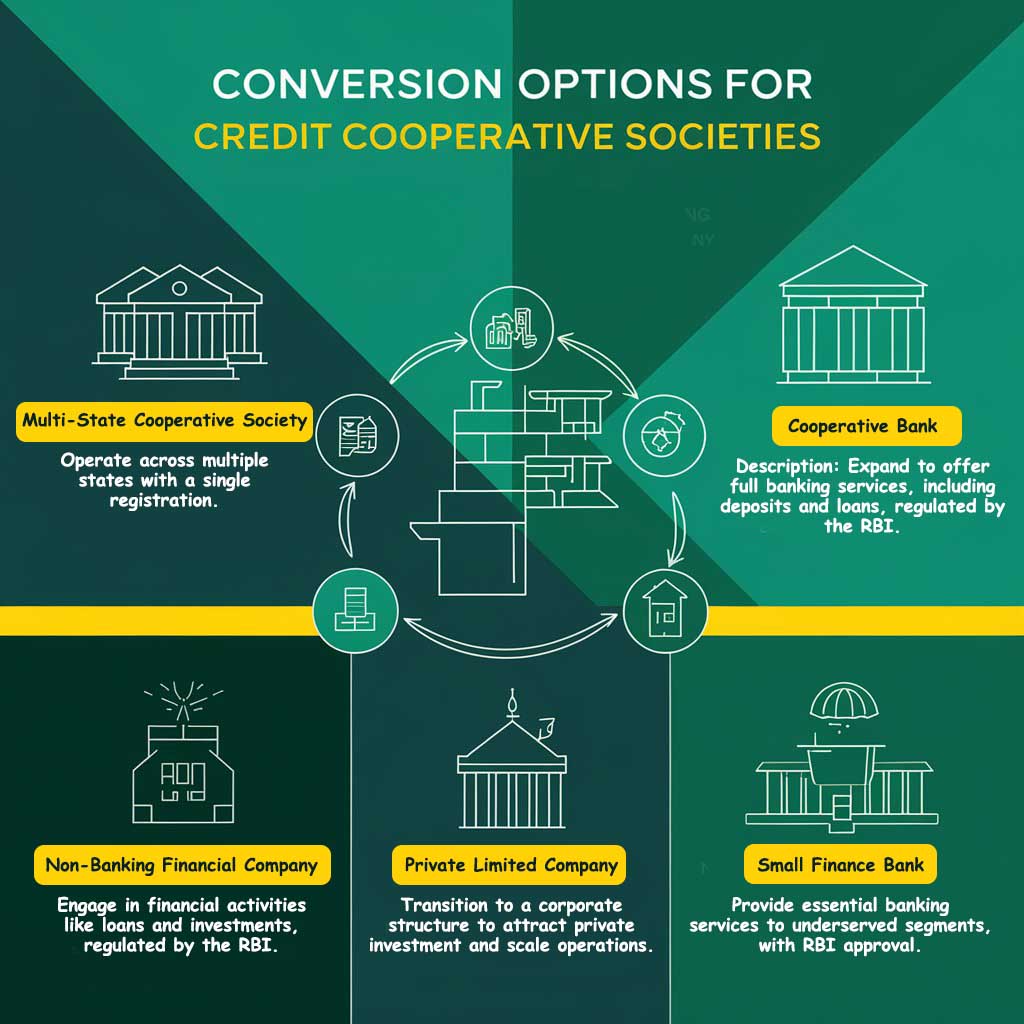Conversion Options for Credit Cooperative Societies in India
Credit cooperative societies have long been a vital part of India’s financial ecosystem, offering affordable credit and financial services to their members, especially in rural and semi-urban areas.
However, as these societies grow and their operational needs evolve, many consider converting into different types of entities to expand their services, enhance their regulatory compliance, and tap into new opportunities.
In this blog post, you’ll learn the various conversion options available for credit cooperative societies in India.
Credit Co-operative societies can convert into –
- Multi-State Cooperative Society
- Cooperative Bank
- Private Limited Company
- Small Finance Bank
- Non-Banking Financial Company (NBFC)
1. Multi-State Cooperative Society
For credit cooperative societies that wish to operate across multiple states, converting into a Multi-State Cooperative Society is an ideal option.
Governed by the Multi-State Cooperative Societies Act, 2002, this conversion allows the society to extend its reach beyond state boundaries while maintaining a single registration.
This is particularly beneficial for societies looking to scale their operations and serve a larger geographical area.
2. Cooperative Bank
Credit cooperative societies often consider converting into a cooperative bank when they aim to expand their banking activities. Cooperative banks are regulated by the Reserve Bank of India (RBI) and can offer a wider range of banking services, including accepting deposits from the general public and providing loans.
This conversion can help societies better serve their members while adhering to stringent regulatory standards.
3. Private Limited Company
For societies looking to attract private investments and operate under a more corporate structure, converting into a Private Limited Company under the Companies Act, 2013, is a viable option.
This conversion allows the entity to scale its operations, access capital markets, and benefit from the flexibility of corporate governance. It’s an attractive choice for societies with ambitious growth plans.
4. Small Finance Bank
Small Finance Banks (SFBs) are niche banks designed to provide essential banking services to underserved segments of the population, such as small business units, small and marginal farmers, and entities in the unorganized sector.
Some credit cooperative societies may consider converting into an SFB, subject to approval from the RBI. This option allows the society to broaden its service offerings and make a significant impact in financial inclusion.
5. Non-Banking Financial Company (NBFC)
Another conversion option for credit cooperative societies is to become a Non-Banking Financial Company (NBFC).
NBFCs operate under the regulatory framework of the RBI and engage in financial activities such as providing loans, credit facilities, and investments in securities.
This conversion is suitable for societies aiming to diversify their financial services and operate with greater flexibility.
Which Types of Entities Have IFSC Codes for Money Transfers Among the above listed entities?
Among the entities listed, the following have IFSC codes for money transfers:
- Cooperative Bank: Cooperative banks, regulated by the Reserve Bank of India (RBI), are integrated into the banking system and possess IFSC codes. These codes enable them to facilitate money transfers through NEFT, RTGS, and IMPS.
- Small Finance Bank: Small Finance Banks (SFBs) are also regulated by the RBI and fully part of the banking system. They have IFSC codes for processing electronic fund transfers.
In contrast, Multi-State Cooperative Societies, Private Limited Companies, and Non-Banking Financial Companies (NBFCs) do not have IFSC codes, as they are not part of the banking system and cannot directly conduct money transfers via NEFT, RTGS, or IMPS.
If you are interested read – Difference between Co-operative banks and Credit Co-operative societies.
Conclusion
Converting a credit cooperative society into another type of entity is a strategic decision that can open up new avenues for growth, compliance, and service expansion.
Whether aiming to operate across states, offer broader banking services, or attract private investment, each conversion option comes with its own set of regulatory requirements and benefits.
Societies considering such a transformation should carefully evaluate their goals, consult with legal and financial experts, and choose the path that best aligns with their future aspirations.
If you’re part of a credit cooperative society and are exploring conversion options, it’s essential to stay informed and make a decision that best serves your members and aligns with your long-term vision.


